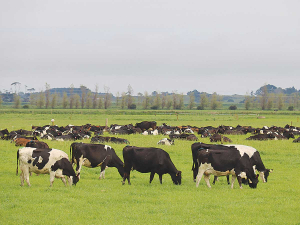Precision N application test costs 'outweigh returns'
Precision application of nitrogen can improve yields, but the costs of testing currently outweigh improved returns, according to new research from Plant and Food Research, MPI and Ravensdown.
 The High Integrity Grass-fed Herds (HIGH) project identifies positive outcomes for pasturebased dairy farms by reducing synthetic nitrogen fertiliser use and improving milk production efficiency from low-cost grazed pasture systems.
The High Integrity Grass-fed Herds (HIGH) project identifies positive outcomes for pasturebased dairy farms by reducing synthetic nitrogen fertiliser use and improving milk production efficiency from low-cost grazed pasture systems.
Australian dairy farmers are backing a new five-year research project looking into reducing the reliance on nitrogen fertilisers used in pasture production.
The High Intensity Grass-fed Herds (HIGH) project identifies positive outcomes for pasture-based dairy farms by reducing synthetic nitrogen fertiliser use and improving milk production efficiency from low-cost grazed pasture systems.
Other elements of the project are focused on adding economic value for non-replacement dairy cows, as well as the enhancement and development of people and skills.
The project has seen the construction of a purpose-built dairy at the Tasmanian Institute of Agriculture's Dairy Research Facility at Elliott in north west Tasmania and the establishment of four new farmlets (or mini farms), to research strategies for reducing reliance on synthetic fertiliser and its impacts under real farm conditions.
Legal controls on the movement of fruits and vegetables are now in place in Auckland’s Mt Roskill suburb, says Biosecurity New Zealand Commissioner North Mike Inglis.
Arable growers worried that some weeds in their crops may have developed herbicide resistance can now get the suspected plants tested for free.
Fruit growers and exporters are worried following the discovery of a male Queensland fruit fly in Auckland this week.
Dairy prices have jumped in the overnight Global Dairy Trade (GDT) auction, breaking a five-month negative streak.
Alliance Group chief executive Willie Wiese is leaving the company after three years in the role.
A booklet produced in 2025 by the Rotoiti 15 trust, Department of Conservation and Scion – now part of the Bioeconomy Science Institute – aims to help people identify insect pests and diseases.
President Donald Trump’s decision to impose tariffs on imports into the US is doing good things for global trade, according…
Seen a giant cheese roll rolling along Southland’s roads?